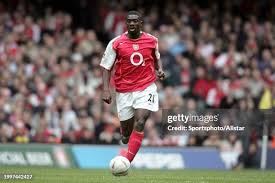
Introduction
Kolo Toure, the Ivorian footballer who became a household name in the world of football, is celebrated for his remarkable career spanning over a decade. As one of the first African players to gain significant recognition in the English Premier League, Toure’s journey is not just a story of personal success, but also a reflection of the increasing diversity within modern football. His passion and dedication on the pitch, along with his charismatic personality off it, have made him a beloved figure among fans globally.
Career Highlights
Kolo Toure was born on March 19, 1981, in Abidjan, Ivory Coast. He began his professional career at ASEC Mimosas before moving to Europe to join Arsenal in 2002. Under the management of Arsène Wenger, Toure quickly established himself as a formidable defender. He was a key member of the famous Arsenal ‘Invincibles’ team that went unbeaten in the 2003-2004 Premier League season, a feat that has yet to be replicated.
After six successful years at Arsenal, where he made over 300 appearances, Toure transferred to Manchester City in 2009. His time at City saw him claim an important role in the team that lifted the 2011 FA Cup, the club’s first major trophy in 35 years. He continued to contribute to the team’s success, winning the Premier League title during his tenure.
In 2013, Toure made a move to Liverpool, where he played for three seasons before retiring in 2017. Throughout his career, Toure was not just known for his defensive prowess, but also for his leadership qualities and infectious positivity that inspired teammates.
Post-Retirement and Legacy
Following his retirement, Kolo Toure transitioned into coaching, wanting to pass on his extensive knowledge of the game. In early 2021, he joined the coaching staff at Celtic FC. His commitment to nurturing young talent reflects his understanding of the game’s evolving nature and his desire to see more African players succeed on the world stage.
Toure’s legacy extends beyond his clubs. He was a pivotal member of the Ivorian national team, representing his country in three FIFA World Cups (2006, 2010, and 2014) and playing a crucial role in winning the Africa Cup of Nations in 2015.
Conclusion
Kolo Toure’s journey from Abidjan to the summit of global football is a testament to his skill, hard work, and resilience. As the footballing world continues to evolve, Toure’s story serves as an inspiration not only for aspiring footballers in Africa but for anyone who dreams of making a mark in their chosen field. His contributions to football will be remembered long after he hangs up his boots, making him a true legend of the game.
You may also like

Jack Willis: The Rising Star of English Rugby

The Rise of Harvey Elliott in Football
